Who are the Falashes, or was A. S. Pushkin a Jew
Categories: Celebrities | Culture | History | Nations | World
By Pictolic https://pictolic.com/article/who-are-the-falashes-or-was-a-s-pushkin-a-jew.htmlEveryone knows that the ancestors of the great Russian poet A. S. Pushkin were Black people — that's how in the old days in Russia they called dark-skinned immigrants from Africa. Moreover, we know that the poet's great-grandfather was brought from Abyssinia, which is located on the territory of modern Ethiopia. That's probably all. Meanwhile, Pushkin's ancestors have an exact nationality and, perhaps, the origin of the genius of Russian literature is even more exotic than we think.
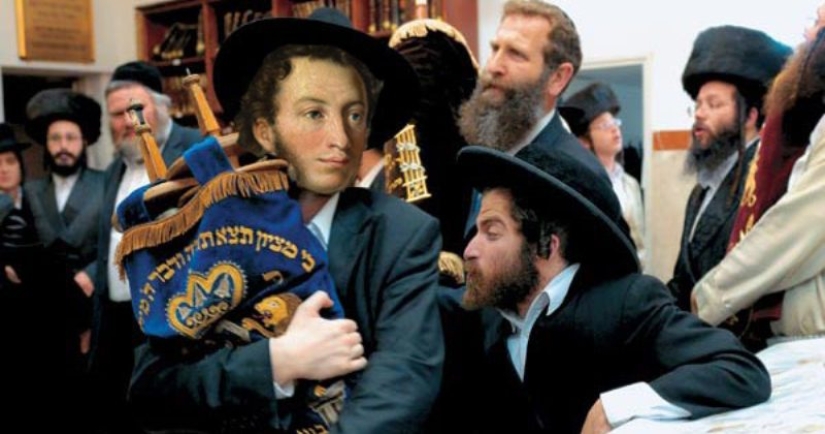
The people who gave the world a literary genius live in Africa today. These are the Falash, who, according to their origin and religious beliefs, are considered... Jews. Therefore, being a falash, Pushkin's great-grandfather professed Judaism, and not Christianity or Islam, as many believe.
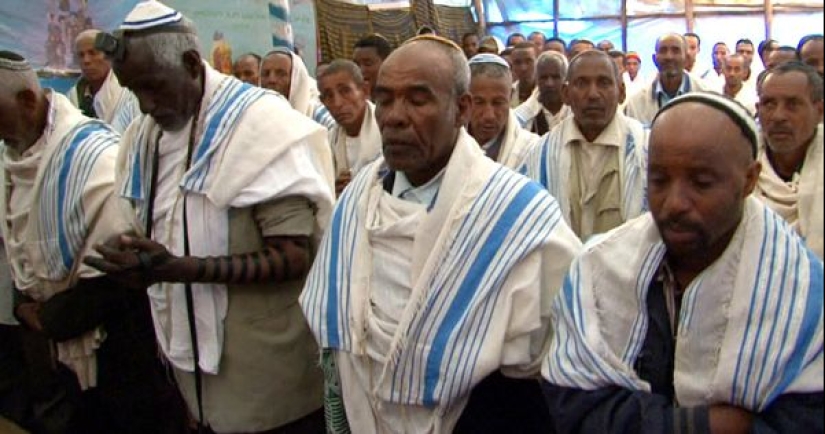
Falasha men at prayer
To understand the difficult question of Alexander Sergeevich's nationality, we will turn to specialists. Here is what the historian Andrey Zelev writes about this issue:
Everything is logical here. But at the same time, as we can see, nothing prevented Ibrahim from professing Islam or Christianity. The version that the poet's ancestor was a Christian can be immediately rejected. It is well known that Hannibal was baptized in 1707 in Vilna (Vilnius).
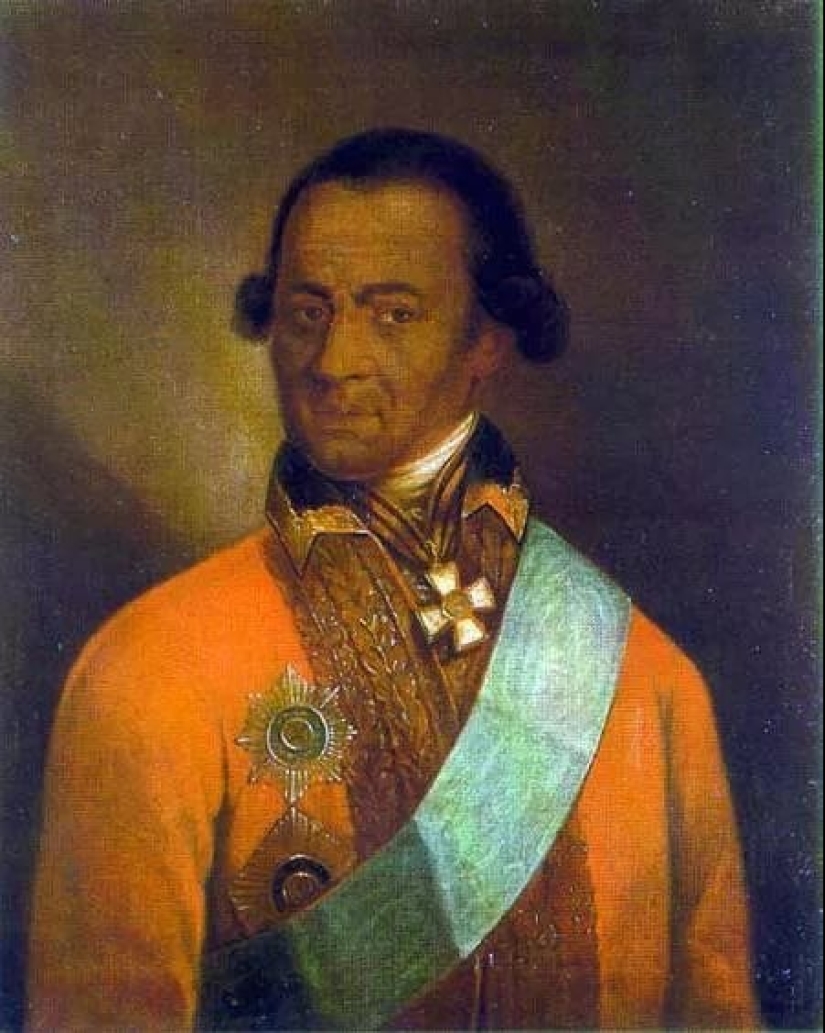
Abram Petrovich Hannibal
The fact that the Abyssinian Prince Ibrahim was a Muslim is also very controversial. The fact is that Islam prohibits enslaving co-religionists and even more so selling them into slavery to people who profess other religions — this is a big sin. At the same time, history has preserved information that Pushkin's ancestor was bought from Muslims at the slave market in Istanbul.
Appearance in Ibrahim's death coincides with one of the bloody wars in which the Falash suffered a crushing defeat from the Christians. There is a high probability that the victors sold the captured Jewish prince to Muslim slave traders, who sent him to the slave market in the Resplendent Porto.
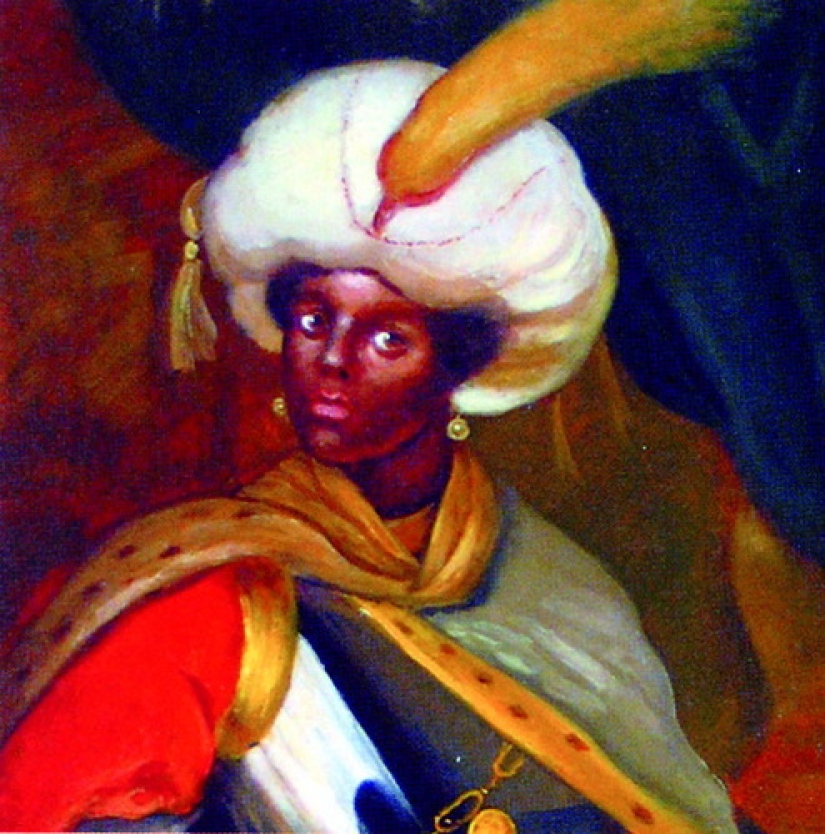
Ibrahim (Abram) Hannibal
Abram Petrovich Hannibal was born in 1697 in the Ethiopian city of Lagon. He was the youngest son of a prince whose possessions were located in the north of Abyssinia. During the war, the boy was captured and ended up in Constantinople. There he was bought as a gift to the Russian tsar Peter I and brought to Moscow.
A smart child with an exotic appearance immediately fell in love with Peter Alekseevich. The tsar was very impressed by the boy's thirst for knowledge and he personally engaged in his primary education. When Abram grew up, the emperor assigned him the best teachers he could find in the two capitals.
The tsar himself baptized the favorite in Vilna, in the church of Paraskeva Friday, where he turned from Ibrahim into Abram Petrovich. The boy received his nickname Hannibal in honor of the great ancient commander from Carthage, who was especially appreciated by Peter.

Tsar Peter I with his pet
Peter Alekseevich rarely parted with his favorite, so Hannibal became a participant in many famous battles, including the Battle of Poltava. In 1717, the tsar still parted with the young man, sending him to study in France. There, the young man devoted six years to studying military affairs, seamanship, mathematics and foreign languages.
Returning to In Russia, Hannibal received his first position at the court — he became the caretaker of the royal cabinet, as well as the main translator of foreign literature. A little later, his duties began to include the training of young officers in mathematics and engineering.
After the death of Peter, a black streak began in Abram's life — he fell into disgrace and was removed from the court. Everything got better only with the accession of Elizabeth Petrovna, who sacredly honored the memory of her father and favored all his colleagues and favorites. Abram Petrovich was caressed by the attention of the royal person, received several estates and a number of state awards as a gift.

Anshef General Abram Petrovich Hannibal in full dress uniform
During this period, Hannibal left a significant mark in the history of the state — he participated in the construction of many fortresses and was one of the authors of the Ladoga Canal project. In addition, Petr's favorite realized himself as a talented manager. He was in charge of the Kronstadt fortress, was for some time the commandant of Revel (Tallinn), and also the governor of Vyborg. No less successful was the military career of Abram Petrovich — he headed the Russian artillery for several years and rose to the high rank of general-anshef.
Map of Abyssinia at the beginning of the XX century
Arab geographers and travelers used another name — Habash, and Europeans-a derivative of this word — Abyssinia. Historians believe that Ethiopia was the country of the legendary biblical Queen of Sheba, who visited King Solomon with grandiose gifts to personally verify his wisdom.
From Solomon, the queen gave birth to a son, Menelik, who, according to legend, became the ancestor of all the Abyssinian rulers. Having ascended the throne, Menelik went to his father, who gave him an ark with the tables of the Law. Also, many young Jews came to the country with the young king, who became the main guides of Judaism.

Members of the Beit Israel Ethiopian community
More recently, Ethiopia was home to the largest Jewish community in Africa, "Beit Israel" or "House of Israel". Members of the community are called falashami, from the Ethiopian "falasi", that is, an exile. The famous Soviet writer and Pushkin scholar Yu.N. Tynyanova claims that Pushkin's great-grandfather, Abram Petrovich Hannibal, was a falash. The Russian poet himself cherished his African roots very much and was proud of them.

Emperor Haile Selassie I
Those who doubt the Abyssinian roots of the Russian literary genius should take a look at the portrait of the most famous monarch of Ethiopia-Haile Selassie I. It is difficult to deny the external similarity of the ruler with Pushkin. Haile Selassie I is considered a descendant of Menelik, the son of the biblical King Solomon and the Queen of Sheba.
Portrait of A. S. Pushkin by Karl Maser. The ring in all the later portraits of the poet was on his thumb
It is known that Pushkin for many years wore a ring on his finger, which was given to him in Countess Elizabeth Vorontsova in Odessa. It was a massive gold ring with an insert of carnelian. An octagonal seal with unknown letters and clusters of grapes was carved on the stone.
This ring has a very interesting fate. After the poet's death, it was handed over to V. A. Zhukovsky, who passed it on to his son, Pavel. He presented it to Ivan Sergeyevich Turgenev, who, in turn, planned to present the relic to Leo Tolstoy. But this was not to happen and the ring remained with Turgenev until his death.
In the end, a close friend of the writer, the French singer Pauline Viardot, gave the decoration to the museum of the Alexander Lyceum. After the February revolution of 1917, the traces of Pushkin's ring are lost — it was stolen from the museum's exposition. It is quite possible that the relic was melted down, as was often done with stolen jewelry.
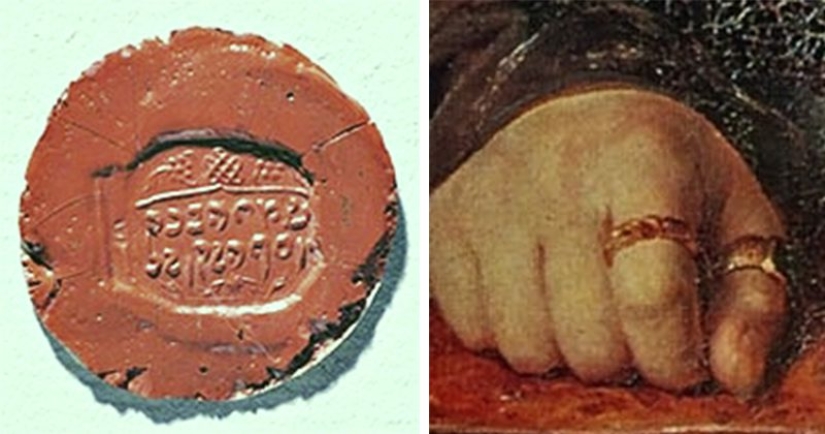
An impression of a seal on sealing wax and a fragment of a portrait by Tropinin
The seal impressions on the sealing wax have been preserved, which made it possible to decipher the mysterious inscription on the carnelian. It read: "Simcha, the son of the venerable Rabbi Yosef, the wise one, may his memory be blessed." Obviously, Pushkin did not know about what was inscribed on his favorite ring, since he wrote about it to his close friend V. A. Zhukovsky: "The Kabbalistic signs carved on the ring awaken something in me... as if long forgotten."
Maybe these signs awakened images in the poet, hidden deep in the genetic memory? It is difficult not to believe in mysticism after that — it was not by chance that the ring with the writings turned out to be in the possession of a poet whose ancestors read sacred books in this language.
Is there any other evidence of the Jewish origin of A. S. Pushkin? It turns out that there are enough of them. Let's start with the fact that Pyotr Alekseevich called his blackamoor Abram. A rather rare name for a Christian or a Muslim, isn't it? At the same time, it is well known that children are often called Abrams in the Falash families of Ethiopia.
The great-grandmother of the poet Christina-Regina von Scheberg, who was the second wife of Abram Petrovich Hannibal, gave birth to her husband five wonderful sons: Ivan, Peter, Isaac, Jacob and Joseph. If with Ivan and If everything is clear to Peter, then the names of the younger offspring are alarming. The poet's grandfather was Joseph Abramovich Hannibal (1744-1807), who was not a bit complex because of his Jewish name and all his life signed correspondence with his full name-Joseph Hannibal.

Joseph Abramovich Hannibal
It was later, when Jewry became unpopular, the proponents of the Russification of Pushkin's roots began to call the poet's ancestor Osip Abramovich in order to smooth out the combination that cut the ears of anti-Semites. An interesting piquant story is connected with Pushkin's grandfather — he was a bigamist. With his living wife Maria Alekseevna Pushkina, he managed to marry the widow of Captain Tolstoy once again. To pull this off, he had to pretend to be a widower, misleading everyone.
The father of the grandmother of the Russian poet — Maria Alekseevna Hannibal (1745-1819), was the Tambov governor Alexey Fedorovich Pushkin. But her mother's name was Sarah Yuryevna Rzhevskaya, which hardly indicates her native Russian origin.

Nadezhda Iosifovna Pushkina — the poet's mother
Alexander Sergeevich's mother, Nadezhda Iosifovna Pushkin (1775-1836), was the daughter of the same Sarah Rzhevskaya. If you look at it in detail, then this woman was half Jewish, a quarter German and only a little Russian. Looking at the portraits of this woman, it is easy to notice the dominance of Semitic facial features.
The poet's Jewishness is indirectly confirmed by the fact that both his father Sergei Lvovich Pushkin and he himself were members of a Masonic lodge — a global sect with Jewish Kabbalistic roots.
To remove the last doubts about the origin of Alexander Pushkin, take a look at this young Israeli soldier from the Ethiopian Falashi people. It is difficult to deny the similarity.
But why does Pushkin's nationality bother modern researchers so much? After all, the poet's genius belongs to the whole world and is available to everyone. This interest is primarily caused by the fact that many people want to learn the secret of the poet's genius, which has remained unsurpassed for two centuries. And, of course, national pride plays a role — you will agree that it is pleasant to realize that the blood of your people flowed in the veins of a great poet.

A girl from the Falashi people
The life of the great Russian poet is fraught with many secrets and amazing facts that will long excite the minds of researchers and ordinary connoisseurs of his talent.
Keywords: Genius | Jews | Mystery | Judaism | Ring | Freemasons | Poet | Pushkin | North africa | Ethiopia
Post News ArticleRecent articles

It's high time to admit that this whole hipster idea has gone too far. The concept has become so popular that even restaurants have ...

There is a perception that people only use 10% of their brain potential. But the heroes of our review, apparently, found a way to ...
Related articles

We present to your attention a small but cheerful collection of photos on the theme of «annoying situations in everyday life ...

Many are tormented by an unusual question: why are there so many grandmothers with purple or lilac hair around? Why do they paint ...

In 1970 in the valley Isdale in Norway passers-by found the burnt body of a woman. What at first looked like an accident, start to ...

New Year's is a time to surprise and delight loved ones not only with gifts but also with a unique presentation of the holiday ...